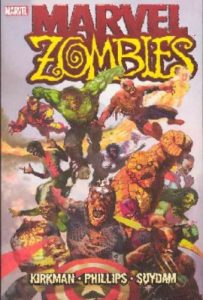You know that something has become a bona fide phenomenon[1] when it starts generating its own spin-offs. Not that Marvel wasn’t already a phenomenon, but the Ultimate series and 1602 and Marvel Zombies are the kind of thing I’m talking about here. Or when Cheers spawned Frasier. So, but obviously I’m really talking about comics, and specifically still about Marvel Zombies. Because what I would not have expected was for the important people at Marvel (by whom I guess I mean Joe Quesada, but who can keep track?) to already have spawned yet another alternate earth, just slightly different from the one where the interstellar zombie plague arose in the first place, in which to insert Ash from the Evil Dead series, as portrayed by an extremely young Bruce Campbell, and let him and the Necronomicon take on the ravening heroic hordes. I mean, really?
That said, if you like Marvel Zombies and you like Ash, you will definitely like this book. He fits in surprisingly well, and everyone’s reactions to him (disdain or disgust, for the most part) really felt pitch perfect to me. And yet his charmed existence keeps him going far longer than any mortal human in the Marvel universe has a right to, even before the zombie thing is a factor. But mostly, this is a laugh. Here’s the way I can tell the author knew exactly what book he was writing, in four words: Howard the goddamn Zombie Duck.
[1] I am not endorsing this outcome, only observing it.
 I’ve been sitting on this book for over two years, apparently. As has often been the case in my various Marvel readings, it’s worked out really well for me, the delay. Sure, there are things I haven’t read yet and things that haven’t happened yet and so on, but the very fact of making it all the way through Stan Lee’s era as chief editor of Marvel (which ended just this month, basically, where this month is September of 1972) means that I have seen at least most of what any given Marvel homage is going to make reference to. And boy howdy does
I’ve been sitting on this book for over two years, apparently. As has often been the case in my various Marvel readings, it’s worked out really well for me, the delay. Sure, there are things I haven’t read yet and things that haven’t happened yet and so on, but the very fact of making it all the way through Stan Lee’s era as chief editor of Marvel (which ended just this month, basically, where this month is September of 1972) means that I have seen at least most of what any given Marvel homage is going to make reference to. And boy howdy does